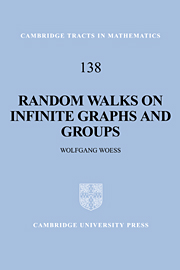
-
Select format
-
- Publisher:
- Cambridge University Press
- Publication date:
- 22 September 2009
- 13 February 2000
- ISBN:
- 9780511470967
- 9780521552929
- 9780521061728
- Dimensions:
- (228 x 152 mm)
- Weight & Pages:
- 0.61kg, 348 Pages
- Dimensions:
- (228 x 152 mm)
- Weight & Pages:
- 0.52kg, 352 Pages
You may already have access via personal or institutional login
Book description
The main theme of this book is the interplay between the behaviour of a class of stochastic processes (random walks) and discrete structure theory. The author considers Markov chains whose state space is equipped with the structure of an infinite, locally finite graph, or as a particular case, of a finitely generated group. The transition probabilities are assumed to be adapted to the underlying structure in some way that must be specified precisely in each case. From the probabilistic viewpoint, the question is what impact the particular type of structure has on various aspects of the behaviour of the random walk. Vice-versa, random walks may also be seen as useful tools for classifying, or at least describing the structure of graphs and groups. Links with spectral theory and discrete potential theory are also discussed. This book will be essential reading for all researchers working in stochastic process and related topics.
Reviews
Review of the hardback:‘This is an excellent book, where beginners and specialists alike will find useful information. It will become one of the major references for all those interested directly or indirectly in random walks. I highly recommend it.’
L. Saloff-Coste Source: Bulletin of the London Mathematical Society
Review of the hardback:‘… will be essential reading for all researchers in stochastic processes and related topics.’
Source: European Maths Society Journal
Contents
Metrics
Altmetric attention score
Full text views
Full text views help Loading metrics...
Loading metrics...
* Views captured on Cambridge Core between #date#. This data will be updated every 24 hours.
Usage data cannot currently be displayed.
Accessibility standard: Unknown
Why this information is here
This section outlines the accessibility features of this content - including support for screen readers, full keyboard navigation and high-contrast display options. This may not be relevant for you.
Accessibility Information
Accessibility compliance for the PDF of this book is currently unknown and may be updated in the future.


